2019年英语专业八级翻译系列:汉译英--哲学类1
- 格式:docx
- 大小:38.99 KB
- 文档页数:4
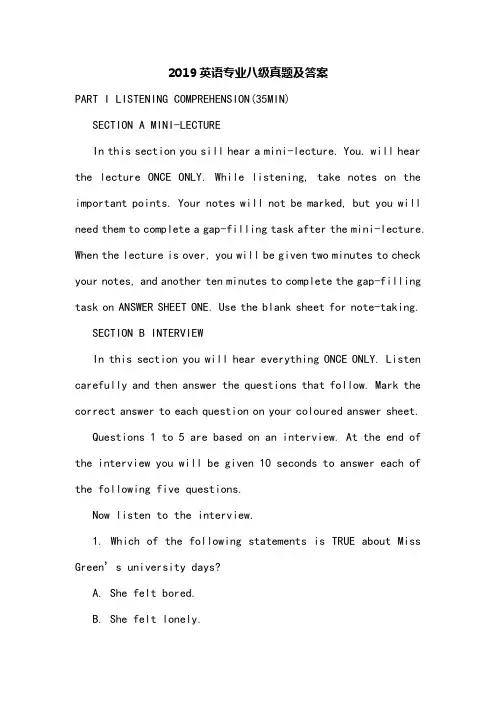
2019英语专业八级真题及答案PART I LISTENING COMPREHENSION(35MIN)SECTION A MINI-LECTUREIn this section you sill hear a mini-lecture. You. will hear the lecture ONCE ONLY. While listening, take notes on the important points. Your notes will not be marked, but you will need them to complete a gap-filling task after the mini-lecture. When the lecture is over, you will be given two minutes to check your notes, and another ten minutes to complete the gap-filling task on ANSWER SHEET ONE. Use the blank sheet for note-taking. SECTION B INTERVIEWIn this section you will hear everything ONCE ONLY. Listen carefully and then answer the questions that follow. Mark the correct answer to each question on your coloured answer sheet. Questions 1 to 5 are based on an interview. At the end of the interview you will be given 10 seconds to answer each of the following five questions.Now listen to the interview.1. Which of the following statements is TRUE about Miss Green’s university days?A. She felt bored.B. She felt lonely.C. She cherished them.D. The subject was easy.2. Which of the following is NOT part of her job with the Department of Employment?A. Doing surveys at workplace.B. Analyzing survey results.C. Designing questionnaires.D. Taking a psychology course.3. According to Miss Green, the main difference between the Department of Employment and the advertising agency lies inA. the nature of work.B. office decoration.C. office location.D. work procedures.4. Why did Miss green want to leave the advertising agency?A. She felt unhappy inside the company.B. She felt work there too demanding.C. She was denied promotion in the company.D. She longed for new opportunities.5. How did Miss Green react to a heavier workload in the new job?A. She was willing and ready.B. She sounded mildly eager.C. She a bit surprised.D. She sounded very reluctant.SECTION C NEWS BROADCASTIn this section you will hear everything ONCE ONLY. Listen carefully and then answer the questions that follow. Mark the correct answer to each question on your coloured answer sheet. Questions 6 and 7 based on the following news. At the end of the news item, you will be given 10 seconds to answer each of the two questions.Now listen to the news.6. The man stole the aircraft mainly because he wanted toA. destroy the European Central Bank.B. have an interview with a TV station.C. circle skyscrapers in downtown Frankfurt.D. remember the death of a US astronaut.7. Which of the following statements about the man is TRUE?A. He was a 31-year-old student from Frankfurt.B. He was piloting a two-seat helicopter he had stolen.C. He had talked to air traffic controllers by radio.D. He threatened to land on the European Central Bank.Question 8 is based on the following news. At the end of thenews item, you will be given 10 seconds to answer the question. Now listen to the news.8. The news is mainly about the city government’s plan toA. expand and improve the existing subway system.B. build underground malls and parking lots.C. prevent further land subsidence.D. promote advanced technology.Questions 9 and 10 are based on the following news. At the end of the news item, you will be given 10 seconds to answer each of the two questions.Now listen to the news.9. According to the news, what makes this credit card different from conventional ones isA. that it can hear the owner’s voice.B. that it can remember a password.C. that it can identify the owner’s voice.D. that it can remember the owner’s PIN.10. The newly developed credit card is said to said to have all the following EXCEPTA. switch.B. battery.C. speaker.D. built-in chip.参考答案:Section A Mini-lecture1.the author2.other works3.literary trends4.grammar,diction or uses of image5.cultural codes6.cultural7.the reader8.social9.reader competency10. social sructure,traditions of writing or political cultural influences,etc.Section B Interview1-5 CDDDASection C News Broadcast6-10 DCBCAPART II READING COMPREHENSION(30MIN)In this section there are four reading passages followed by a total of 20 multiple-choice questions.Read the passages and then mark your answers on your colouredanswer sheet.TEXT AThe University in transformation, edited by Australian futurists Sohail Inayatullah and Jennifer Gidley, presents some 20 highly varied outlooks on tomorrow’s universities by writers representing both Western and mon-Western perspectives. Their essays raise a broad range of issues, questioning nearly every key assumption we have about higher education today.The most widely discussed alternative to the traditional campus is the Internet University - a voluntary community to scholars/teachers physically scattered throughout a country or around the world but all linked in cyberspace. A computerized university could have many advantages, such as easy scheduling, efficient delivery of lectures to thousands or even millions of students at once, and ready access for students everywhere to the resources of all the world’s great libraries.Yet the Internet University poses dangers, too. For example, a line of franchised courseware, produced by a few superstar teachers, marketed under the brand name of a famous institution, and heavily advertised, might eventually come to dominate the global education market, warns sociology professor Peter Manicas of the University of Hawaii at Manoa. Besides enforcinga rigidly standardized curriculum, such a “college education in a box” could undersell the offerings of many traditional brick and mortar institutions, effectively driving then out of business and throwing thousands of career academics out of work, note Australian communications professors David Rooney and Greg Hearn.On the other hand, while global connectivity seems highly likely to play some significant role in future higher education, that does not mean greater uniformity in course content - or other dangers - will necessarily follow. Counter-movements are also at work.Many in academia, including scholars contributing to this volume, are questioning the fundamental mission of university education. What if, for instance, instead of receiving primarily technical training and building their individual careers, university students and professors could focus their learning and research efforts on existing problems in their local communities and the world? Feminist scholar Ivana Milojevic dares to dream what a university might become “if we believed that child-care workers and teachers in early childhood education should be one of the highest (rather than lowest) paid professionals?”Co-editor Jennifer Gidley shows how tomorrow’s university faculty, instead of giving lectures and conducting independent research, may take on three new roles. Some would act as brokers, assembling customized degree-credit programmes for individual students by mixing and matching the best course offerings available from institutions all around the world. A second group, mentors, would function much like today’s faculty advisers, but are likely to be working with many more students outside their own academic specialty. This would require them to constantly be learning from their students as well as instructing them.A third new role for faculty, and in Gidley’s view the most challenging and rewarding of all, would be as meaning-makers: charismatic sages and practitioners leading groups of students/colleagues in collaborative efforts to find spiritual as well as rational and technological solutions to specific real-world problems.Moreover, there seems little reason to suppose that any one form of university must necessarily drive out all other options. Students may be “enrolled” in courses offered at virtual campuses on the Internet, between -or even during - sessions at a real-world problem-focused institution.As co-editor Sohail Inayatullah points out in his introduction, no future is inevitable, and the very act of imagining and thinking through alternative possibilities can directly affect how thoughtfully, creatively and urgently even a dominant technology is adapted and applied. Even in academia, the future belongs to those who care enough to work their visions into practical, sustainable realities.11. When the book reviewer discusses the Internet University,A. he is in favour of it.B. his view is balanced.C. he is slightly critical of it.D. he is strongly critical of it.12. Which of the following is NOT seen as a potential danger of the Internet University?A. Internet-based courses may be less costly than traditional ones.B. Teachers in traditional institutions may lose their jobs.C. internet-based courseware may lack variety in course content.D. The Internet University may produce teachers with a lot of publicity.13. According to the review, what is the fundamental mission of traditional university education?A. Knowledge learning and career building.B. Learning how to solve existing social problems.C. Researching into solutions to current world problems.D. Combining research efforts of teachers and students in learning.14. Judging from the Three new roles envisioned for tomorrow’s university faculty, university teachersA, are required to conduct more independent research.B. are required to offer more course to their students……C. are supposed to assume more demanding duties.D. are supposed to supervise more students in their specialty.15. Which category of writing does the review belong to?A. Narration.B. DescriptionC. persuasionD. Exposition.TEXT BEvery street had a story, every building a memory, Those blessed with wonderful childhoods can drive the streets oftheir hometowns and happily roll back the years. The rest are pulled home by duty and leave as soon as possible. After Ray Atlee had been in Clanton (his hometown) for fifteen minutes he was anxious to get out.The town had changed, but then it hadn’t. On the highways leading in, the cheap metal buildings and mobile homes were gathering as tightly as possible next to the roads for maximum visibility. This town had no zoning whatsoever. A landowner could build anything wiih no permit no inspection, no notice to adjoining landowners. nothing. Only hog farms and nuclear reactors required approvals and paperwork. The result was a slash-and-build clutter that got uglier by the year.But in the older sections, nearer the square, the town had not changed at all The long shaded streets were as clean and neat as when Kay roamed them on his bike. Most of the houses were still owned by people he knew, or if those folks had passed on the new owners kept the lawns clipped and the shutters painted. Only a few were being neglected. A handful had been abandoned.This deep in Bible country, it was still an unwritten rule in the town that little was done on Sundays except go to church, sit on porches, visit neighbours, rest and relax the way Godintended.It was cloudy, quite cool for May, and as he toured his old turf, killing time until the appointed hour for the family meeting, he tried to dwell on the good memories from Clanton. There was Dizzy Dean Park where he had played little League for the Pirates, and (here was the public pool he’d swum in every summer except 1969 when the city closed it rather than admit black children. There were the churches - Baptist, Methodist, and Presbyterian - facing each other at the intersection of Second and Elm like wary sentries, their steeples competing for height. They were empty now, hut in an hour or so the more faithful would gather for evening services.The square was as lifeless as the streets leading to it. With eight thousand people, Clanton was just large enough to have attracted the discount stores that had wiped out so many small towns. But here the people had been faithful to their downtown merchants, and there wasn’t s single empty or boarded-up building around the square - no small miracle. The retail shops were mixed in with the banks and law offices and cafes, all closed for the Sabbath.He inched through the cemetery and surveyed the Atlee section in the old part, where the tombstones were grander. Someof his ancestors had built monuments for their dead. Ray had always assumed that the family money he’d never seen must have been buried in those graves. He parked and walked to his mother’s grave, something he hadn’t done in years. She was buried among the Atlees, at the far edge of the family plot because she had barely belonged.Soon, in less than an hour, he would be sitting in his father’s study, sipping bad instant tea and receiving instructions on exactly how his father would be laid to rest. Many orders were about to be give, many decrees and directions, because his father(who used to be a judge) was a great man and cared deeply about how he was to be remembered.Moving again, Ray passed the water tower he’d climbed twice, the second time with the police waiting below. He grimaced at his old high school, a place he’d never visited since he’d left it. Behind it was the football field where his brother Forrest had romped over opponents and almost became famous before getting bounced off the team.It was twenty minutes before five, Sunday, May 7. Time for the family meeting.16. From the first paragraph, we get the impression thatA. Ray cherished his childhood memories.B. Ray had something urgent to take care of.C. Ray may not have a happy childhood.D. Ray cannot remember his childhood days.17. Which of the following adjectives does NOT describe Ray’s hometown?A. Lifeless.B. Religious.C. Traditional.D. Quiet.18. Form the passage we can infer that the relationship between Ray and his parents wasA. close.B. remote.C. tense.D. impossible to tell.19. It can be inferred from the passage that Ray’s father was all EXCEPTA. considerate.B. punctual.C. thrifty.D. dominant.TEXT CCampaigning on the Indian frontier is an experience by itself. Neither the landscape nor the people find their counterparts in any other portion of the globe. Valley walls rise steeply five or six thousand feet on every side. The columns crawl through a maze of giant corridors down which fierce snow-fed torrents foam under skies of brass. Amid these scenes of savage brilliancy there dwells a race whose qualities seem to harmonize with their environment. Except at harvest-time, when self-preservation requires a temporary truce, the Pathan tribes are always engaged in private or public war. Every man is a warrior, a politician and a theologian. Every large house is a real feudal fortress made, it is true, only of sun-baked clay, but with battlements, turrets, loopholes, drawbridges, etc. complete. Every village has its defence. Every family cultivates its vendetta; every clan, its feud. The numerous tribes and combinations of tribes all have their accounts to settle with one another. Nothing is ever forgotten, and very few debts are left unpaid. For the purposes of social life, in addition to the convention about harvest-time, a most elaborate code of honour has been established and is on the whole faithfully observed. A man who knew it and observed it faultlessly might pass unarmed from oneend of the frontier to another. The slightest technical slip would, however, be fatal. The life of the Pathan is thus full of interest; and his valleys, nourished alike by endless sunshine and abundant water, are fertile enough to yield with little labour the modest material requirements of a sparse population.Into this happy world the nineteenth century brought two new facts: the rifle and the British Government. The first was an enormous luxury and blessing; the second, an unmitigated nuisance. The convenience of the rifle was nowhere more appreciated than in the Indian highlands. A weapon which would kill with accuracy at fifteen hundred yards opened a whole new vista of delights to every family or clan which could acquire it. One could actually remain in one’s own house and fire at one’s neighbour nearly a mile away. One could lie in wait on some high crag, and at hitherto unheard-of ranges hit a horseman far below. Even villages could fire at each other without the trouble of going far from home. Fabulous prices were therefore offered for these glorious products of science. Rifle-thieves scoured all India to reinforce the efforts of the honest smuggler. A steady flow of the coveted weapons spread its genial influence throughout the frontier, and the respect which thePathan tribesmen entertained for Christian civilization was vastly enhanced.The action of the British Government on the other hand was entirely unsatisfactory. The great organizing, advancing, absorbing power to the southward seemed to be little better than a monstrous spoil-sport. If the Pathan made forays into the plains, not only were they driven back (which after all was no more than fair), but a whole series of subsequent interferences took place, followed at intervals by expeditions which toiled laboriously through the valleys, scolding the tribesmen and exacting fines for any damage which they had done. No one would have minded these expeditions if they had simply come, had a fight and then gone away again. In many cases this was their practice under what was called the “butcher and bolt policy”to which the Government of India long adhered. But towards the end of the nineteenth century these intruders began to make roads through many of the valleys, and in particular the great road to Chitral. They sought to ensure the safety of these roads by threats, by forts and by subsidies. There was no objection to the last method so far as it went. But the whole of this tendency to road-making was regarded by the Pathans with profound distaste. All along the road people were expected tokeep quiet, not to shoot one another, and above all not to shoot at travellers along the road. It was too much to ask, and a whole series of quarrels took their origin from this source.20. The word debts in “very few debts are left unpaid” in the first paragraph meansA. loans. B. accounts C.killings D.bargains.21. Which of the following is NOT one of the geographical facts about the Indian frontier?A. Melting snows.B. Large population.C. Steep hillsides.D. Fertile valleys.22. According to the passage, the Pathans welcomedA. the introduction of the rifle.B. the spread of British rule.C. the extension of luxuriesD. the spread of trade.23. Building roads by the BritishA. put an end to a whole series of quarrels.B. prevented the Pathans from earning on feuds.C. lessened the subsidies paid to the Pathans.D. gave the Pathans a much quieter life.24. A suitable title for the passage would beA. Campaigning on the Indian frontier.B. Why the Pathans resented the British rule.C. The popularity of rifles among the Pathans.D. The Pathans at war.TEXT D“Museum” is a slippery word. It first meant (in Greek) anything consecrated to the Muses: a hill, a shrine, a garden, a festival or even a textbook. Both Plato’s Academy and Aristotle’s Lyceum had a mouseion, a muses’ shrine. Although the Greeks already collected detached works of art, many temples - notably that of Hera at Olympia (before which the Olympic flame is still lit) - had collections of objects, some of which were works of art by well-known masters, while paintings and sculptures in the Alexandrian Museum were incidental to its main purpose.The Romans also collected and exhibited art from disbanded temples, as well as mineral specimens, exotic plants, animals; and they plundered sculptures and paintings (mostly Greek) for exhibition. Meanwhile, the Greek word had slipped into Latin by transliteration (though not to signify picture galleries, which were called pinacothecae) and museum still more or less meant “Muses’ shrine”.The inspirational collections of precious and semi-preciousobjects were kept in larger churches and monasteries - which focused on the gold-enshrined, bejewelled relics of saints and martyrs. Princes, and later merchants, had similar collections, which became the deposits of natural curiosities: large lumps of amber or coral, irregular pearls, unicorn horns, ostrich eggs, fossil bones and so on. They also included coins and gems - often antique engraved ones - as well as, increasingly, paintings and sculptures. As they multiplied and expanded, to supplement them, the skill of the fakers grew increasingly refined.At the same time, visitors could admire the very grandest paintings and sculptures in the churches, palaces and castles; they were not “collected” either, but “site-specific”, and were considered an integral part both of the fabric of the buildings and of the way of life which went on inside them - and most of the buildings were public ones. However, during the revival of antiquity in the fifteenth century, fragments of antique sculpture were given higher status than the work of any contemporary, so that displays of antiquities would inspire artists to imitation, or even better, to emulation; and so could be considered Muses’ shrines in the former sense. The Medici garden near San Marco in Florence, the Belvedere and the Capitolin Rome were the most famous of such early “inspirational”collections. Soon they multiplied, and, gradually, exemplary “modern” works wereIn the seventeenth century, scientific and prestige collecting became so widespread that three or four collectors independently published directories to museums all over the known world. But it was the age of revolutions and industry which produced the next sharp shift in the way the institution was perceived: the fury against royal and church monuments prompted antiquarians to shelter them in asylum-galleries, of which the Musee des Monuments Francais was the most famous. Then, in the first half of the nineteenth century, museum funding took off, allied to the rise of new wealth: London acquired the National Gallery and the British Museum, the Louvre was organized, the Museum-Insel was begun in Berlin, and the Munich galleries were built. In Vienna, the huge Kunsthistorisches and Naturhistorisches Museums took over much of the imperial treasure. Meanwhile, the decline of craftsmanship (and of public taste with it) inspired the creation of “improving”collections. The Victoria and Albert Museum in London was the most famous, as well as perhaps the largest of them.25.The sentence “Museum is a slippery word” in the firstparagraph means thatA. the meaning of the word didn’t change until after the 15th century.B. the meaning of the word had changed over the years.C. the Greeks held different concepts from the Romans.D. princes and merchants added paintings to their collections.26.The idea that museum could mean a mountain or an object originates fromA. the Romans.B. Florence.C. Olympia.D. Greek.27. “……the skill of the fakers grew increasingly refined” in the third paragraph means thatA. there was a great demand for fakers.B. fakers grew rapidly in number.C. fakers became more skillful.D. fakers became more polite.28. Painting and sculptures on display in churches in the 15th century wereA. collected from elsewhere.B. made part of the buildings.C. donated by people.D. bought by churches.29. Modern museums came into existence in order toA. protect royal and church treasures.B. improve existing collections.C. stimulate public interest.D. raise more funds.30. Which is the main idea of the passage?A. Collection and collectors.B. The evolution of museums.C. Modern museums and their functions.D. The birth of museums.11-15 BAACD 16-20 CDBAC 21-25BABAB 26-30 DCBABPART III. 人文知识There are ten multiple-choice questions in this section.Choose the best answers to each question.Mark your answers on your coloured answer sheet.31.The Presidents during the American Civil War wasA. Andrew JacksonB. Abraham LincolnC. Thomas JeffersonD. George Washington32.The capital of New Zealand isA.ChristchurchB.AucklandC.WellingtonD.Hamilton33.Who were the natives of Austrilia before the arrival of the British settlers?A.The AboriginesB.The MaoriC.The IndiansD.The Eskimos34.The Prime Minister in Britain is head ofA.the Shadow CabinetB.the ParliamentC.the OppositionD.the Cabinet35.Which of the following writers is a poet of the 20th century?A.T.S.EliotwrenceC.Theodore DreiserD.James Joyce36.The novel For Whom the Bell Tolls is written byA.Scott FitzgeraldB.William FaulknerC.Eugene O’NeilD.Ernest Hemingway37._____ is defined as an expression of human emotion which is condensed into fourteen linesA.Free verseB.SonnetC.OdeD.Epigram38.What essentially distinguishes semantics and pragmatics is the notion ofA.referenceB.meaningC.antonymyD.context39.The words”kid,child,offspring” are examples ofA.dialectal synonymsB.stylistic synonymsC.emotive synonymsD.collocational synonyms40.The distinction between parole and langue was made byA.HalliayB.ChomskyC.BloomfieldD.Saussure参考答案: 31-35BCADA 36-40 DBDBDPART IV 改错参考答案1. agreeing-agreed2. in which 可有可无3. in his disposal- at his disposal4.enables-enable5.the other English speakers-other English speakers6.old-older7.seen-understood8.take it for granted- take for granted9.or-and10. the most striking of human achievementsV. 汉译英及参考译文中国民族自古以来从不把人看作高于一切,在哲学文艺方面的表现都反映出人在自然界中与万物占着一个比例较为恰当的地位,而非绝对统治万物的主宰。
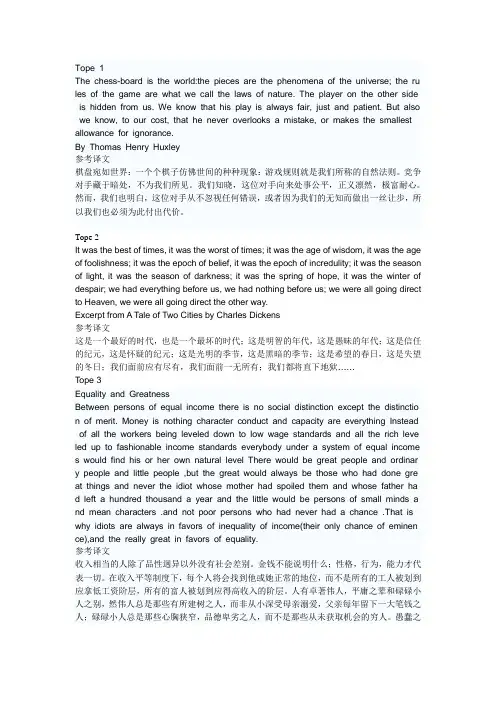
Tope 1The chess-board is the world:the pieces are the phenomena of the universe; the ru les of the game are what we call the laws of nature. The player on the other side is hidden from us. We know that his play is always fair, just and patient. But also we know, to our cost, that he never overlooks a mistake, or makes the smallest allowance for ignorance.By Thomas Henry Huxley参考译文棋盘宛如世界:一个个棋子仿佛世间的种种现象:游戏规则就是我们所称的自然法则。
竞争对手藏于暗处,不为我们所见。
我们知晓,这位对手向来处事公平,正义凛然,极富耐心。
然而,我们也明白,这位对手从不忽视任何错误,或者因为我们的无知而做出一丝让步,所以我们也必须为此付出代价。
Tope 2It was the best of times, it was the worst of times; it was the age of wisdom, it was the age of foolishness; it was the epoch of belief, it was the epoch of incredulity; it was the season of light, it was the season of darkness; it was the spring of hope, it was the winter of despair; we had everything before us, we had nothing before us; we were all going direct to Heaven, we were all going direct the other way.Excerpt from A Tale of Two Cities by Charles Dickens参考译文这是一个最好的时代,也是一个最坏的时代;这是明智的年代,这是愚昧的年代;这是信任的纪元,这是怀疑的纪元;这是光明的季节,这是黑暗的季节;这是希望的春日,这是失望的冬日;我们面前应有尽有,我们面前一无所有;我们都将直下地狱……Tope 3Equality and GreatnessBetween persons of equal income there is no social distinction except the distinctio n of merit. Money is nothing character conduct and capacity are everything Instead of all the workers being leveled down to low wage standards and all the rich leve led up to fashionable income standards everybody under a system of equal income s would find his or her own natural level There would be great people and ordinar y people and little people ,but the great would always be those who had done gre at things and never the idiot whose mother had spoiled them and whose father ha d left a hundred thousand a year and the little would be persons of small minds a nd mean characters .and not poor persons who had never had a chance .That is why idiots are always in favors of inequality of income(their only chance of eminen ce),and the really great in favors of equality.参考译文收入相当的人除了品性迥异以外没有社会差别。
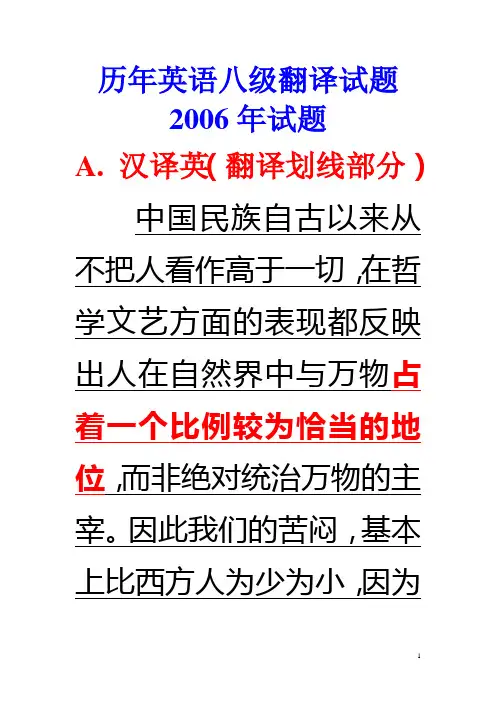
历年英语八级翻译试题2006年试题A. 汉译英(翻译划线部分)中国民族自古以来从不把人看作高于一切,在哲学文艺方面的表现都反映出人在自然界中与万物占着一个比例较为恰当的地位,而非绝对统治万物的主宰。
因此我们的苦闷,基本上比西方人为少为小,因为苦闷的强弱原是随欲望与野心的大小而转移的。
农业社会的人比工业社会的人享受差得多,因此欲望也小得多,况中国古代素来以不滞于物、不为物役为最主要的人生哲学。
并非我们没有守财奴,但比起莫利哀与巴尔扎克笔下的守财奴与野心家,就小巫见大巫了。
中国民族多数是性情中正平和、淡泊、朴实,比西方人容易满足。
讨论稿1. (仅供参考!):From the ancient times (Since time immemorial) the Chinese people have neverviewed the human beings as superior in the world, which is completely reflected in what they’ve done in their philosophy and art, showing that a human being has the status quite appropriately in proportion to other things on earth, rather than an absolute ruler in the world. Therefore, what we’ve suffered is much less and smaller compared with the westerners, for thedepressions vary with the different desires and the ambitions the people have. People in the agricultural society have much less enjoyment than those in the industrial society, thus their desire much less. What’s more, in ancient China, Chinese people always took the concept//notion of “Never addict oneself as a slave to material wealth” mainly as their philosophyin life.[语言通俗、结构连贯]讨论稿2.The Chinese nation has never believed in human supremacy. And the nation finds full expression in the philosophy, literature and art that human coexist with other species in nature with a proportionally proper rather than an absolutely dominant position. Therefore we generally suffer less depression thanWesterners, as the degree of the suffering varies with that of our desire and ambition. People in the agricultural society have much less enjoyment than those in the industrial society, and hence less desire. Moreover, the main Chinese ancient philosophy of life is always to be free from the encumbrance or enslavement of the outside world. Certainly there areamong us misers(守财奴)and careerists(野心家)depicted(描述)by Moliere and Balzac. In comparison with Westerners, the Chinese people, easier to be satisfied, are mostly unbiased(无偏见), peaceful, unworldly and guileless(厚道).(邵志洪译)[用词更讲究]2007年试题Section A:Translate the underlined part of thefollowing text into English:暮色中,河湾里落满云霞,与天际的颜色混合在一起,分不清哪是流云哪是水湾。
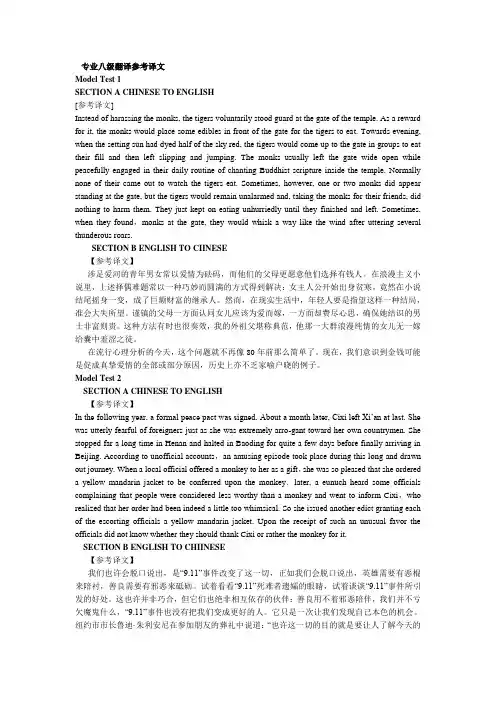
专业八级翻译参考译文Model Test 1SECTION A CHINESE TO ENGLISH[参考译文]Instead of harassing the monks, the tigers voluntarily stood guard at the gate of the temple. As a reward for it, the monks would place some edibles in front of the gate for the tigers to eat. Towards evening, when the setting sun had dyed half of the sky red, the tigers would come up to the gate in groups to eat their fill and then left slipping and jumping. The monks usually left the gate wide open while peacefully engaged in their daily routine of chanting Buddhist scripture inside the temple. Normally none of their came out to watch the tigers eat. Sometimes, however, one or two monks did appear standing at the gate, but the tigers would remain unalarmed and, taking the monks for their friends, did nothing to harm them. They just kept on eating unhurriedly until they finished and left. Sometimes, when they found,monks at the gate, they would whisk a way like the wind after uttering several thunderous roars.SECTION B ENGLISH TO CIINESE【参考译文】涉足爱河的青年男女常以爱情为砝码,而他们的父母更愿意他们选择有钱人。
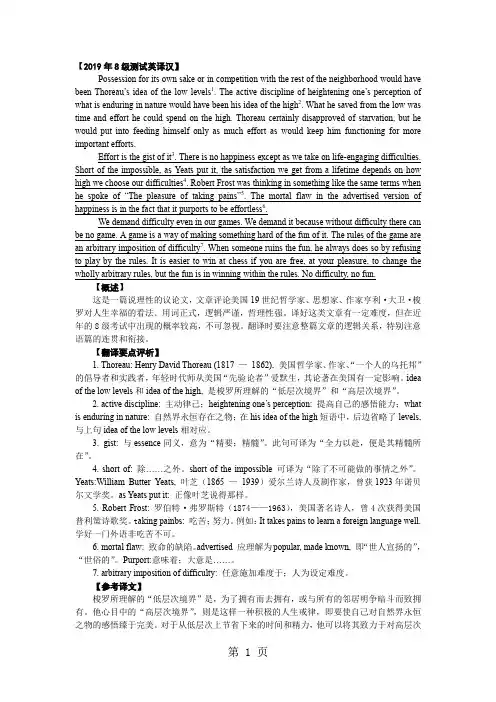
【2019年8级测试英译汉】Possession for its own sake or in competition with the rest of the neighborhood would have been Thoreau’s idea of the low levels1. The active discipline of heightening one’s perception of what is enduring in nature would have been his idea of the high2. What he saved from the low was time and effort he could spend on the high. Thoreau certainly disapproved of starvation, but he would put into feeding himself only as much effort as would keep him functioning for more important efforts.Effort is the gist of it3. There is no happiness except as we take on life-engaging difficulties. Short of the impossible, as Yeats put it, the satisfaction we get from a lifetime depends on how high we choose our difficulties4. Robert Frost was thinking in something like the same terms when he spoke of “The pleasure of taking pains”5. The mortal flaw in the advertised version of happiness is in the fact that it purports to be effortless6.We demand difficulty even in our games. We demand it because without difficulty there can be no game. A game is a way of making something hard of the fun of it. The rules of the game are an arbitrary imposition of difficulty7. When someone ruins the fun, he always does so by refusing to play by the rules. It is easier to win at chess if you are free, at your pleasure, to change the wholly arbitrary rules, but the fun is in winning within the rules. No difficulty, no fun.【概述】这是一篇说理性的议论文,文章评论美国19世纪哲学家、思想家、作家亨利·大卫·梭罗对人生幸福的看法。
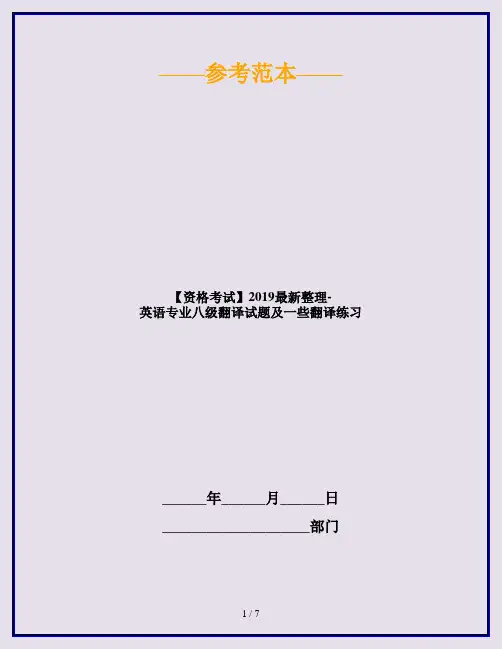
——参考范本——【资格考试】2019最新整理-英语专业八级翻译试题及一些翻译练习______年______月______日____________________部门全国英语专业八级考试(TEM8)的翻译部分(汉译英)原文全文如下:得病以前,我受父母宠爱,在家中横行霸道,一旦隔离,拘禁在花园山坡上一幢小房子里,我顿感打入冷宫,十分郁郁不得志起来。
一个春天的傍晚,园中百花怒放,父母在园中设宴,一时宾客云集,笑语四溢。
我在山坡的小屋里,悄悄掀起窗帘,窥见园中大千世界,一片繁华,自己的哥姐,堂表弟兄,也穿插其间,个个喜气洋洋。
一霎时,一阵被人摒弃,为世所遗的悲愤兜上心头,禁不住痛哭起来。
阅学生之译文,笔者发现有一个问题值得我们教师注意,即如何在动笔翻译前,能迅速正确地确定英译的主语。
如:1. 得病以前,我受父母宠爱,在家中横行霸道。
学生译文(以下简称“学译”):Before the illness, I was much petted by parents, doing everything at will in the home.学译:Before I became ill, I have received all the favor of my parents, just like a little tyrant at home.参考译文:Before I fell ill, I had been the bully under our roofs owing to my doting parents.我们知道,汉语表达大多为“意合”结构,结构松散,以一个一个看似并列的短句“拼凑而成,彼此逻辑关系不明显;但英语则不同于汉语,它是形合语言,非常讲究句子内部的逻辑关系的”外化“,所谓”外化“,即,使用Connectives来表现其逻辑关系。
我国译界有一个比喻:汉语句子的结构像”竹竿“,是一节接一节的;而英语句子则像”葡萄“,主干很短,而”挂“在上面的附加成分则很多。
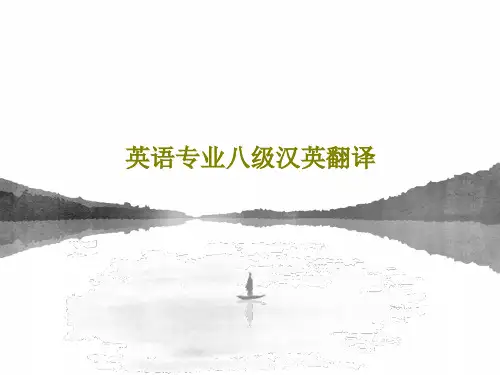
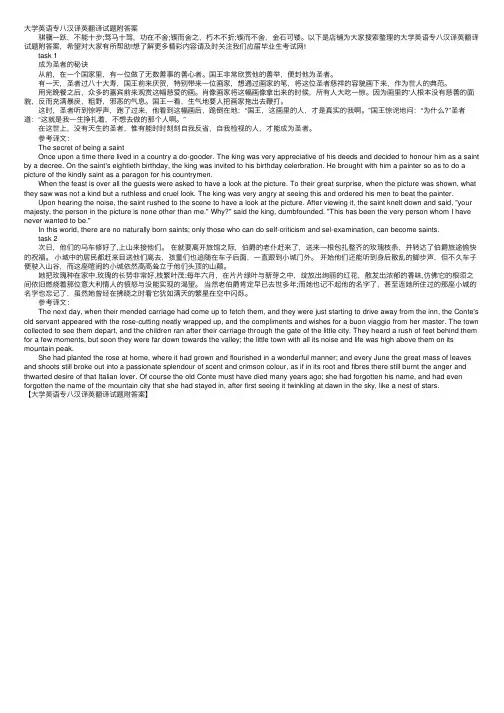
⼤学英语专⼋汉译英翻译试题附答案 骐骥⼀跃,不能⼗步;驽马⼗驾,功在不舍;锲⽽舍之,朽⽊不折;锲⽽不舍,⾦⽯可镂。
以下是店铺为⼤家搜索整理的⼤学英语专⼋汉译英翻译试题附答案,希望对⼤家有所帮助!想了解更多精彩内容请及时关注我们应届毕业⽣考试⽹! task 1 成为圣者的秘诀 从前,在⼀个国家⾥,有⼀位做了⽆数善事的善⼼者。
国王⾮常欣赏他的善举,便封他为圣者。
有⼀天,圣者过⼋⼗⼤寿,国王前来庆贺,特别带来⼀位画家,想通过画家的笔,将这位圣者慈祥的容貌画下来,作为世⼈的典范。
⽤完晚餐之后,众多的嘉宾前来观赏这幅慈爱的画。
肖像画家将这幅画像拿出来的时候,所有⼈⼤吃⼀惊。
因为画⾥的'⼈根本没有慈善的⾯貌,反⽽充满暴戾,粗野,邪恶的⽓息。
国王⼀看,⽣⽓地要⼈把画家拖出去鞭打。
这时,圣者听到惊呼声,跑了过来,他看到这幅画后,跪倒在地:“国王,这画⾥的⼈,才是真实的我啊。
”国王惊诧地问:“为什么?”圣者道:“这就是我⼀⽣挣扎着,不想去做的那个⼈啊。
” 在这世上,没有天⽣的圣者,惟有能时时刻刻⾃我反省,⾃我检视的⼈,才能成为圣者。
参考译⽂: The secret of being a saint Once upon a time there lived in a country a do-gooder. The king was very appreciative of his deeds and decided to honour him as a saint by a decree. On the saint's eightieth birthday, the king was invited to his birthday celerbration. He brought with him a painter so as to do a picture of the kindly saint as a paragon for his countrymen. When the feast is over all the guests were asked to have a look at the picture. To their great surprise, when the picture was shown, what they saw was not a kind but a ruthless and cruel look. The king was very angry at seeing this and ordered his men to beat the painter. Upon hearing the noise, the saint rushed to the scene to have a look at the picture. After viewing it, the saint knelt down and said, "your majesty, the person in the picture is none other than me." Why?" said the king, dumbfounded. "This has been the very person whom I have never wanted to be." In this world, there are no naturally born saints; only those who can do self-criticism and sel-examination, can become saints. task 2 次⽇,他们的马车修好了,上⼭来接他们。
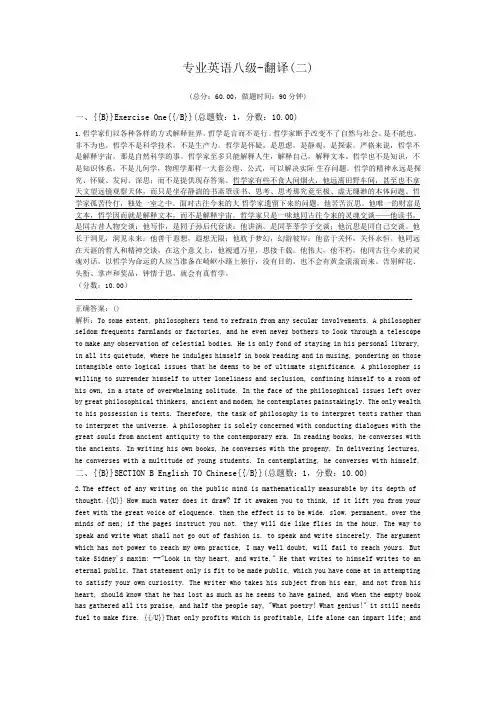
专业英语八级-翻译(二)(总分:60.00,做题时间:90分钟)一、{{B}}Exercise One{{/B}}(总题数:1,分数:10.00)1.哲学家们以各种各样的方式解释世界。
哲学是言而不是行。
哲学家断乎改变不了自然与社会。
是不能也,非不为也。
哲学不是科学技术,不是生产力。
哲学是怀疑,是思虑,是静观,是探索。
严格来说,哲学不是解释宇宙,那是自然科学的事。
哲学家至多只能解释人生,解释自己,解释文本。
哲学也不是知识,不是知识体系,不是儿何学,物理学那样一大套公理、公式,可以解决实际生存问题。
哲学的精神永远是探究、怀疑、发问、深思;而不是提供现存答案。
哲学家有些不食人间烟火,他远离田野车间,甚至也不拿天文望远镜观察天体,而只是坐存静湍的书斋罩读书、思考、思考那究竟至极、虚无缫渺的本体问题。
哲学家孤苦伶仃,独处一室之中。
面对古往今来的大哲学家遗留下来的问题,他苦苦沉思。
他唯一的财富是文本,哲学因而就是解释文本,而不是解释宇宙。
哲学家只是一味地同古往今来的灵魂交谈——他读书,是同古昔人物交谈:他写作,是同子孙后代奁谈;他讲演,是同莘莘学子交谈;他沉思是同自己交谈。
他长于洞见,洞见未来;他善于遐想,遐想无限;他耽于梦幻,幻游彼岸;他富于关怀,关怀永恒。
他同远在天涯的哲人和精神交谈,在这个意义上,他视通万里,思接千载。
他伟大,他不朽,他同古往今来的灵魂对话。
以哲学为命运的人应当准备在崎岖小路上独行,没有目的,也不会有黄金滚滚而来。
告别鲜花、头衔、掌声和奖品,钟情于思,就会有真哲学。
(分数:10.00)__________________________________________________________________________________________ 正确答案:()解析:To some extent, philosophers tend to refrain from any secular involvements. A philosopher seldom frequents farmlands or factories, and he even never bothers to look through a telescope to make any observation of celestial bodies. He is only fond of staying in his personal library, in all its quietude, where he indulges himself in book reading and in musing, pondering on those intangible onto logical issues that he deems to be of ultimate significance. A philosopher is willing to surrender himself to utter loneliness and seclusion, confining himself to a room of his own, in a state of overwhelming solitude. In the face of the philosophical issues left over by great philosophical thinkers, ancient and modem, he contemplates painstakingly. The only wealth to his possession is texts. Therefore, the task of philosophy is to interpret texts rather than to interpret the universe. A philosopher is solely concerned with conducting dialogues with the great souls from ancient antiquity to the contemporary era. In reading books, he converses with the ancients. In writing his own books, he converses with the progeny. In delivering lectures, he converses with a multitude of young students. In contemplating, he converses with himself.二、{{B}}SECTION B English TO Chinese{{/B}}(总题数:1,分数:10.00)2.The effect of any writing on the public mind is mathematically measurable by its depth of thought.{{U}} How much water does it draw? If it awaken you to think, if it lift you from your feet with the great voice of eloquence. then the effect is to be wide. slow. permanent, over the minds of men; if the pages instruct you not. they will die like flies in the hour. The way to speak and write what shall not go out of fashion is. to speak and write sincerely. The argument which has not power to reach my own practice, I may well doubt, will fail to reach yours. But take Sidney's maxim: --"Look in thy heart, and write." He that writes to himself writes to an eternal public. That statement only is fit to be made public, which you have come at in attempting to satisfy your own curiosity. The writer who takes his subject from his ear, and not from his heart, should know that he has lost as much as he seems to have gained, and when the empty book has gathered all its praise, and half the people say, "What poetry! What genius!" it still needs fuel to make fire. {{/U}}That only profits which is profitable, Life alone can impart life; andthough we should burst, we can only be valued as we make ourselves valuable.(分数:10.00)__________________________________________________________________________________________ 正确答案:()解析:那么计算标准是什么呢?如果一部作品发人深省,如果它以其伟大雄辩的声音令你有醍醐灌顶之感,那么该作品对人类思想的影响便是宽广、渐进、永恒的。

英语专业八级翻译练习题1.英译汉(1)Possession for its own sake or in competition with the rest of the neighborhood would have been Thoreau's idea of the low levels. The active discipline of heightening one's perception of what is enduring in nature would have been his idea of the high. What he saved from the low was time and effort he could spend on the high. Thoreau certainly disapproved of starvation, but he would put into feeding himself only as much effort as would keep him functioning for more important efforts.Effort is the gist of it. There is no happiness except as we take on life-engaging difficulties. Short of the impossible, as Yeats put it, the satisfaction we get from a lifetime depends on how high we choose our difficulties. Robert Frost was thinking in something like the same terms when he spoke of "The pleasure of taking pains". The mortal flaw in the advertised version of happiness is in the fact that it purports to be effortless.We demand difficulty even in our games. We demand it because without difficulty there can be no game. A game is a way of making something hard for the fun of it. The rules of the game are an arbitrary imposition of difficulty. When someone ruins the fun, he always does so by refusing to play by the rules. It is easier to win at chess if you are free, at your pleasure, to change the wholly arbitrary rules, but the fun is in winning within the rules. No difficulty, no fun.梭罗所理解的"低层次",即为了拥有而去拥有,或与所有的邻居明争暗斗而致拥有。
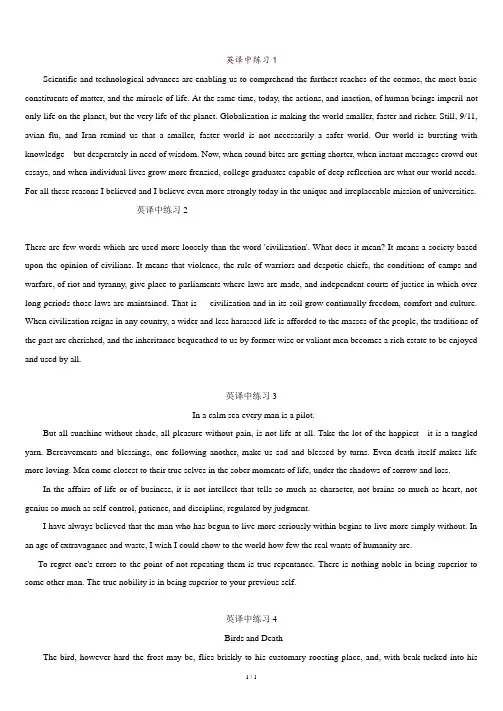
英译中练习1Scientific and technological advances are enabling us to comprehend the furthest reaches of the cosmos, the most basic constituents of matter, and the miracle of life. At the same time, today, the actions, and inaction, of human beings imperil not only life on the planet, but the very life of the planet. Globalization is making the world smaller, faster and richer. Still, 9/11, avian flu, and Iran remind us that a smaller, faster world is not necessarily a safer world. Our world is bursting with knowledge---but desperately in need of wisdom. Now, when sound bites are getting shorter, when instant messages crowd out essays, and when individual lives grow more frenzied, college graduates capable of deep reflection are what our world needs. For all these reasons I believed and I believe even more strongly today in the unique and irreplaceable mission of universities.英译中练习2There are few words which are used more loosely than the word 'civilization'. What does it mean? It means a society based upon the opinion of civilians. It means that violence, the rule of warriors and despotic chiefs, the conditions of camps and warfare, of riot and tyranny, give place to parliaments where laws are made, and independent courts of justice in which over long periods those laws are maintained. That is civilization and in its soil grow continually freedom, comfort and culture. When civilization reigns in any country, a wider and less harassed life is afforded to the masses of the people, the traditions of the past are cherished, and the inheritance bequeathed to us by former wise or valiant men becomes a rich estate to be enjoyed and used by all.英译中练习3In a calm sea every man is a pilot.But all sunshine without shade, all pleasure without pain, is not life at all. Take the lot of the happiest - it is a tangled yarn. Bereavements and blessings, one following another, make us sad and blessed by turns. Even death itself makes life more loving. Men come closest to their true selves in the sober moments of life, under the shadows of sorrow and loss.In the affairs of life or of business, it is not intellect that tells so much as character, not brains so much as heart, not genius so much as self-control, patience, and discipline, regulated by judgment.I have always believed that the man who has begun to live more seriously within begins to live more simply without. In an age of extravagance and waste, I wish I could show to the world how few the real wants of humanity are.To regret one's errors to the point of not repeating them is true repentance. There is nothing noble in being superior to some other man. The true nobility is in being superior to your previous self.英译中练习4Birds and DeathThe bird, however hard the frost may be, flies briskly to his customary roosting-place, and, with beak tucked into hiswing, falls asleep. He has no apprehensions; only the hot blood grows colder and colder, the pulse feebler as he sleeps, and at midnight, or in the early morning, he drops from his perch---death.Yesterday he lived and moved, responsive to a thousand external influences, reflecting earth and sky in his small brilliant brain as in a looking-glass; also he had a various language, the inherited knowledge of his race, the faculty of flight, by means of which he could shoot, meteor-like, across the sky, and pass swiftly from place to place; and with it such perfect control over all his organs, such marvelous certitude in all his motions, as to be able to drop himself plumb down from the tallest tree-top , or out of the void air , on to a slender spray , and scarcely cause its leaves to tremble . Now , on this morning , he lies stiff and motionless ; if you were to take him up and drop him from your hand , he would fall to the ground like a stone or a lump of clay-so easy and swift is the passage from life to death in wild nature! But he was never miserable英译中练习5Hour in the SunJohn H.Bradley"…I was rich,if not in money,in sunny hours and summer days."--Henry David ThoreauWhen Thoreau wrote that line,he was thinking of the Walden.Pond he knew as a boy.Woodchoppers and the Iron Horse had not yet greatly damaged the beauty of its setting.A boy could go to the pond and lie on his back against the seat of a boat,lazily drfiting from shore to shore while the loons dived and the swallows dipped around him.Thoreau loved to recall such sunny hours and summer days"when idleness was the most attractive and productive business."I too was a boy in love with a pond,rich in sunny hours and summer days.Sun and summer are still what the always were,but the boy and the pond changed.The boy,who is now a man,no longer finds much time for idle drifting.The pond has been annexed by a great city.The swamps where herons once hunted are now drained and filled with hourses .The bay where water lilies quietly floated is now a harbor for motor boats.In short,everything that the boy loved no longer exists-- except in the man's memory of it.英译中练习6The old lady had always been proud of the great rose-tree in her garden, and was fond of telling how it had grown from a cutting she had brought years before from Italy, when she was first married. She and her husband had been travelling back in their carriage from Rome (it was before the time of railways )and on a bad piece of road south of Siena they had broken down, and had been forced to pass the night in a little house by the road-side. The accommodation was wretched of course; she had spent a sleepless night, and rising early had stood, wrapped up, at her window, with the cool air blowing on her face, to watch the dawn. She could still, after all these years, remember the blue mountains with the bright moon above them, and how a far-off town on one of the peaks had gradually grown whiter and whiter, till the moon faded, the mountains were touched with the pink of the rising sun, and suddenly the town was lit as by an illumination, one window after another catching and reflecting the sun's beam, till at last the whole little city twinkled and sparkled up in the sky like a nest of stars英译中练习7Some people insist that only today and tomorrow matter.But how much poorer we would be if we really lived by that rule! So much of what we do today is frivolous and futile and soon forgotten.So much of what we hope to do tomorrow never happens.The past is the bank in which we store our most valuable possession: the memories that give meaning and depth to our lives.Those who truly treasure the past will not bemoan the passing of the good old days,because days enshrined in memory are never lost.Death itself is powerless to still a remembered voice or erase a remembered smile.And for one boy who is now a man, there is a pond which neither time nor tide can change,where he can still spend a quiet hour in the sun.英译中练习1参考译文科技进步正在使我们能够探索宇宙的边陲、物质最基本的成分及生命的奇迹。
英语专业八级考试翻译部分历届试题及参考答案说明:本处提供的参考答案完全是为了教学、教育目的而制作,参考答案分别源自福州大学外国语学院英语系翻译课程小组及邹申主编的《新编高等院校英语专业八级考试指南》[2001,上海:上海外语教育出版社](转引自松园英文书院和《中国翻译》等,供同学们学习、比较。
1995年英语专业八级考试--翻译部分参考译文C-E原文:简.奥斯丁的小说都是三五户人家居家度日,婚恋嫁娶的小事。
因此不少中国读者不理解她何以在西方享有那么高的声誉。
但一部小说开掘得深不深,艺术和思想是否有过人之处,的确不在题材大小。
有人把奥斯丁的作品比作越咀嚼越有味道的橄榄。
这不仅因为她的语言精彩,并曾对小说艺术的发展有创造性的贡献,也因为她的轻快活泼的叙述实际上并不那么浅白,那么透明。
史密斯夫人说过,女作家常常试图修正现存的价值秩序,改变人们对“重要”和“不重要”的看法。
也许奥斯丁的小说能教我们学会转换眼光和角度,明察到“小事”的叙述所涉及的那些不小的问题。
参考译文:However, subject matter is indeed not the decisive factor by which we judge a novel of its depth as well as (of ) its artistic appeal and ideological content (or: as to whether a novel digs deep or not or whether it excels in artistic appeal and ideological content). Some people compare Austen’s works to olives: the more you chew them, the more tasty (the tastier) they become. This comparison is based not only on (This is not only because of ) her expressive language and her creative contribution to the development of novel writing as an art, but also on (because of ) the fact that what hides behind her light and lively narrative is something implicit and opaque (not so explicit and transparent). Mrs. Smith once observed, women writers often sought (made attempts) to rectify the existing value concepts (orders) by changing people’s opinions on what is “important”and what is not.E-C原文I, by comparison, living in my overpriced city apartment, walking to work past putrid sacks of street garbage, paying usurious taxes to local and state governments I generally abhor, I am rated middle class. This causes me to wonder, do the measurement make sense? Are we measuring only that which is easily measured--- the numbers on the money chart --- and ignoring values more central to the good life?For my sons there is of course the rural bounty of fresh-grown vegetables, line-caught fish and the shared riches of neighbours’orchards and gardens. There is the unpaid baby-sitter for whose children my daughter-in-law baby-sits in return, and neighbours who barter their skills and labour. But more than that, how do you measure serenity? Sense if self?I don’t want to idealize life in small places. There are times when the outside world intrudes brutally, as when the cost of gasoline goes up or developers cast their eyes on untouched farmland. There are cruelties, there is intolerance, there are all the many vices and meannesses in small places that exist in large cities. Furthermore, it is harder to ignore them when they cannot be banished psychologically to another part of town or excused as the whims of alien groups --- when they have to be acknowledged as “part of us.”Nor do I want to belittle the opportunities for smalldecencies in cities --- the eruptions of one-stranger-to-another caring that always surprise and delight. But these are,sadly,more exceptions than rules and are often overwhelmed by the awful corruptions and dangers that surround us.参考译文:对我的几个儿子来说,乡村当然有充足的新鲜蔬菜,垂钓来的鱼,邻里菜园和果园里可供分享的丰盛瓜果。
2019年英语专业八级考试翻译模拟训练1C-E原文:近读报纸,对国内名片和请柬的议论颇多,于是想起客居巴黎时经常见到的法国人手中的名片和请柬,随笔记下来,似乎不无借鉴之处。
在巴黎,名目繁多的酒会,冷餐会是广交朋友的好机会。
在这种场合陌生人相识,如果是亚洲人,他们往往开口之前先毕恭毕敬地用双手把自己的名片呈递给对方,这好像是不可缺少的礼节。
不过,法国人一般却都不大主动递送名片,双方见面寒暄几句,甚至海阔天空地聊一番也就各自走开,只有当双方谈话投机,希望继续交往时,才会主动掏出名片。
二话不说先递名片反倒显得有些勉强。
E-C英译汉原文:It should have been easy. They were battle-tested veterans with long ties to Reagan and even longer ties to the Republican party, men who understood presidential politics as well as any in the country. The backdrop of the campaign was hospitable, with lots of good news to work with: America was at peace, and the nation’s ec onomy, a key factor in any election, was rebounding vigorously after recession. Furthermore, the campaign itself was lavishly financed, with plenty of money for a top-flight staff, travel, andtelevision commercials. And, most important, their candidate was Ronald Reagan, a president of tremendous personal popularity and dazzling communication skills. Reagan has succeed more than any president since John F. Kennedy in projecting a broad vision of America – a nation of renewed military strength, individual initiative, and smaller federal government.原文:来美国求学的中国学生与其他亚裔学生一样,大多非常刻苦勤奋,周末也往往会抽出一天甚至两天的时间去实验室加班,因而比起美国学生来,成果出得较多。
TRANSLATIONCHINESE TO ENGLISH丄、一个人的生命究竟冇多大意义,这冇什么标准可以衡量吗?捉出一个绝对的标准当然很困难;但是,大体上看一个人对待生命的态度是否严肃认真,看他对待劳动、工作等等的态度如何,也就不难对这个人的存在意义做出适当的估计了。
古来一切有成就的人,都很严肃地对待自己的生命,当他活着一天,总要尽量多劳动、多工作、多学习,不肯虚度年华,不让时间白白地浪费掉。
我国历代的劳动人民及大政治家、大思想家等等都莫不如此。
2、中华民族自古以来从不把人看作高于一切,在哲学文艺方面的表现都反映出人在口然界中与万物占有比例较为恰当的地位,而非绝对统治万物的主宰。
因此我们的苦闷基木上比西方人为少为小;因为苫闷的强弱原是随欲望与野心的人小而转移的。
农业社会的人比工业社会的人享受差得多;因此欲望也小得多。
何况中国占代素來以不滞丁•物、不为物役为最主要的人生哲学。
并非我们没有守财奴,但比起莫里哀与巴尔扎克笔下的守财奴与野心家来,就小巫见大巫了。
中华民族多数是中正和平,淡泊,朴实,比西方人容易满足。
3、暮色屮,河湾里落满云霞,与天际的颜色混合一起,分不清哪是流云,哪是水湾。
也就在这•幅绚烂的图画旁边,在河湾之畔,•群羊正在低头觅食。
它们几乎没冇•个顾得匕抬起头来,看一眼这美丽的黄昏。
也许它们要抓紧时间,在即将回家的最后一刻再次咀嚼。
这是黄河滩上的一幕。
牧羊人不见了,他不知在何处歇息。
只冇这些美生灵自由自在地享受着这个黄昏。
这儿水草肥美,让它们长得滚滚的,像些胖娃娃。
如果走近了,会发现它们那可爱的神情,洁口的才齿,那丰富而单纯的表情。
如果稍稍长久一点儿端详这张张面庞,还会生出无限的怜悯。
4、都市寸土千金,地价炒得越來越高,今天将更高。
拥冇一个小小花园的希槊,对寻常之辈不啻是——种奢望、——种梦想。
我想,英实谁和冇一个小小花园,这便是我们的内心世界。
人的智力需要开发,人的内心世界也是需要开发的。
英语专业八级翻译练习题(一)The Rewards of Living a Solitary LifeThe other day an acquaintance of mine, a gregarious and charming man, told me he had found himself unexpectedly alone in New York for an hour or two between appointments. He went to the Whitney and spent the "empty" time looking at things in solitary bliss. For him it proved to be a shock nearly as great as falling in love to discover that he could enjoy himself so much alone.参考译文:独自生活的报偿前些日子,我的一个熟人,一位热爱交际并很受欢迎的男士告诉我,他在纽约的两个约会之间偶然有一两个小时的空闲,他便去了惠特尼博物馆,四处浏览着展品,无比幸福的度过了那些时光。
发现自已独自一人,也能如此的幸福,他感觉像坠入爱河那般震惊。
英语专业八级翻译练习题(二)What had he been afraid of, I asked myself? That, suddenly alone, he would discover that he bored himself, or that there was, quite simply, no self there to meet? But having taken the plunge, he is now on the brink of adventure; he is about to be launched into his own inner space to the astronaut. His every perception will come to him with a new freshness and, for a time, seem startlingly original.参考译文:“他一直在害怕什么呢?”,我问自已。
英语专业八级考试翻译练习(1)参考答案SECTION A: CHINESE TO ENGLISHBut the depth of a novel and its excellence in artistic quality and ideological content can never be judged by the significance or “insignificance” of the theme. Austen’s works have been compared to olives, which become the more delicious the more you chew them. This is not only because of her witty language and her creative contributions to the development of the art of novel writing, but also because of her vivid and lively narration, which is by no means shallow or transparent. Mrs. Smith said that women writers often tried to rectify the prevalent values and the existing social order and to change people’s views as to what was important and what was unimportant.SECTION B ENGLISH TO CHINESE对我的儿子们来说,乡村当然有充足的新鲜而成熟的蔬菜,采钓的鱼,以及邻里果园和花园里可供分享的丰硕果实,乡下有位不计报酬的保姆,我儿媳看管他的孩子作为回报,.此外(且不说这些)你如何来衡量那种安静那种自我感呢?我无意将小城镇的生活理想化,因为有时外部的世界无情地侵入,比如汽油价格上涨或开发商着眼于未被染指的农田时,令人无法忍受的大城市的所有种种罪恶和卑劣行径在这小地方也同样存在.不仅如此当人们无法将它们解释为异族的怪异而不得不承认这一切都是我们自己的一部分时, 就更加难以忽视它们了.英语专业八级考试翻译练习(2)参考答案SECTION A: CHINESE TO ENGLISHIn Paris, cocktail parties and buffet receptions of different kinds offer great opportunities for making friends. On such occasions, strangers may get to know each other. If they are Asians, they will, very respectfully and with both hands, present their calling cards to their interlocutors before any conversation starts. This seems to be the required courtesy on their part. The French, however, usually are not so ready with such a formality. Both sides will greet each other, and even chat casually about any topic and then excuse themselves. Only when they find they like each other and hope to further the relationship will they exchange cards. It will seem very unnatural to do so before any real conversation gets under way.SECTION B ENGLISH TO CHINESE这应该不是件难事。
专业英语八级(哲理类英译汉)模拟试卷1(题后含答案及解析) 题型有: 5. TRANSLATIONPART V TRANSLATION (60 MIN)SECTION B ENGLISH TO CHINESEDirections: Translate the following text into Chinese.1.Three passions, simple but overwhelmingly strong, have governed my life: the longing for love, the search for knowledge, and unbearable pity for the suffering of mankind. These passions, like great winds, have blown me hither and thither, in a wayward course, over a deep ocean of anguish, reaching to the verge of despair. I have sought love, first, because it brings ecstasy —ecstasy so great that I would have sacrificed all the rest of life for a few hours of this joy. I have sought it, next, because it relieves loneliness —that terrible loneliness in which one shivering consciousness looks over the rim of the world into cold unfathomable lifeless abyss. I have sought it, finally, because in the union of love I have seen, in a mystic miniature, the prefiguring vision of the heaven that saints and poets have imagined. This is what I sought, and though it might seem too good for human life, this is what —at last —I have found.正确答案:我一生有三个愿望,简单却极其强烈:一是对爱的渴望,二是对知识的探索,三是对人类痛苦的无限悲悯。
2019年英语专业八级翻译系列:汉译英--哲学类1
一个人生活在世上,就好像水泥搅拌器里的石子一样,运转起来之后,身不由己。
使我们感觉到,不是某一个人的问题,而是社会问题,而
是文化问题。
耶稣临死的时候说:“宽容他们!他们做的他们不知道。
”年轻时候读这句话,觉得稀松平常,长大之后,也觉得这句话
没有力量。
但是到了我现在这个年龄,才发现这句话多么深奥,多么
痛心。
使我想到我们中国人,成了今天这个样子,我们的丑陋,来自
于我们不知道我们丑陋。
我到爱荷华,我们夫妇的经费是由爱荷华大
学出一半,再由私人捐助一半,捐助一半的是爱荷华燕京饭店老板,
一位从没有回过中国的中国人裴竹章先生,我们从前没见过面,捐了
一个这么大的数目,使我感动。
他和我谈话,他说:“我在没有看你
的书之前,我觉得中国人了不起,看了你的书之后,才觉得不是那么
一回事,所以说,我想请你当面指教。
”
背景介绍
《丑陋的中国人》是台湾作家柏杨先生的作品,其实是一部他在各地
以《丑陋的中国人》为题演讲的合集。
作者指出中国传统文化有一种
滤过性疾病,这种疾病使我们的子子孙孙受感染,到今天也不能痊愈。
这篇杂文虽不如鲁迅先生的杂文来得犀利,但是更为深刻,翻译时要
注意用词。
难点解析
1. “一个人生活在世上……”:这里“一个人生活在世上” ,无
需译成“when people live in this world”, 只需要翻译成“life is like...”,这样更显简练。
2. 运转起来之后:这里用“toss”更好,因为是在水泥搅拌器里,“toss”更能体现出搅拌的意味。
3. 身不由己:这里的意思是身处社会中,人失去对自己的控制,所
以用“loses control of its own existence”更为贴切。
4. “使我们感觉到,不是某一个人的问题,而是社会问题,而是文
化问题。
”:在这句话的翻译中,作者增译“I could cite similar analogies”以此作为强调。
“不是……而是……”能够使用
“not ...but ...”句型,中文喜用散句,而英文喜用整句,故此
句可合译为一句话:“The conclusion I always come to is that the problems of the Chinese people are not individual but rather social and cultural problems.”。
5. 耶稣临死的时候说:“宽容他们!他们做的他们不知道。
”:圣
经中多用简单词汇;所以即使没有读过圣经,也能够译出。
全句译为:Before he died, Jesus said, “Forgive them, for they know not what they do”。
6. “年轻时候读这句话,觉得稀松平常……”:“稀松平常”如
果翻译成“common things”则太显平淡,如用两个形容词“bland”
和“frivolous”表明“稀松”和“平常”则更夺人眼球。
7.“……这句话没有力量” :说明作者觉得上述所言缺乏实质,
不能给人力量,故可译为“lacked substance”,如若译成:“statement lacks power.”则显得不地道。
8.“但是到了我现在这个年龄”:此句中“到了我现在这个年龄”如
若译成“when it comes to my age”略显累赘,只需译为“now”就
能够了。
9. “……才发现这句话多么深奥,多么痛心”:“才发现…… ” 可用强调句式“Only...”的倒装句,“发现”一词能够用“appreciate” ,透露出作者随年龄增长能品味出“Jesus’ statement”的意义。
全句译为:“Only now do I appreciate its profundity and bitter irony.”这里用“bitter irony”来表明作
者的痛苦,讽刺。
10. “使我想到我们中国人,成了今天这个样子,我们的丑陋,来自
于我们不知道我们丑陋” :整句话缺少一个主语,但是从整个句子
能够看出,主语为“Jesus’ statement” ,但因前文已用过“statement”一词,故此处能够用“word”代替。
“来自于”能够
译成“grow out of”,“out of”有“出于……”的意思。
全句译为:“Jesus’ words taught me that the Chinese people’s ugliness grows out of our own ignorance of the fact that we
are ugly.”。
参考译文
Life is a little bit like a stone in a cement mixer; when it gets tossed around with the other ingredients, it loses
control of its own existence. I could cite similar analogies, but the conclusion I always come to is that the problems of
the Chinese people are not individual but rather social and cultural problems. Before he died, Jesus said, “Forgive them, for they know not what they do”. When I rst heard that statement as a child, I thought it rather bland and frivolous, and as I grew older I continued to feel that it lacked substance. Only now do I appreciate its profundity and bitter irony. Jesus’ words taught me that the Chinese people’s ugliness grows out of our own ignorance of the fact that we
are ugly. The expenses for our trip to the United States were borne by Iowa University and Pei Zhuzhang, the owner of the Yenching Restaurant in Iowa City. Pei is a Chinese-American who had never set foot on China, nor met me before.
His generosity moved me deeply. He said, “Before reading
your books, I felt that the Chinese people were a great people. After reading them my thinking changed entirely. Your books inspired me and made me want to hear you speak in person.”
选自《丑陋的中国人》。